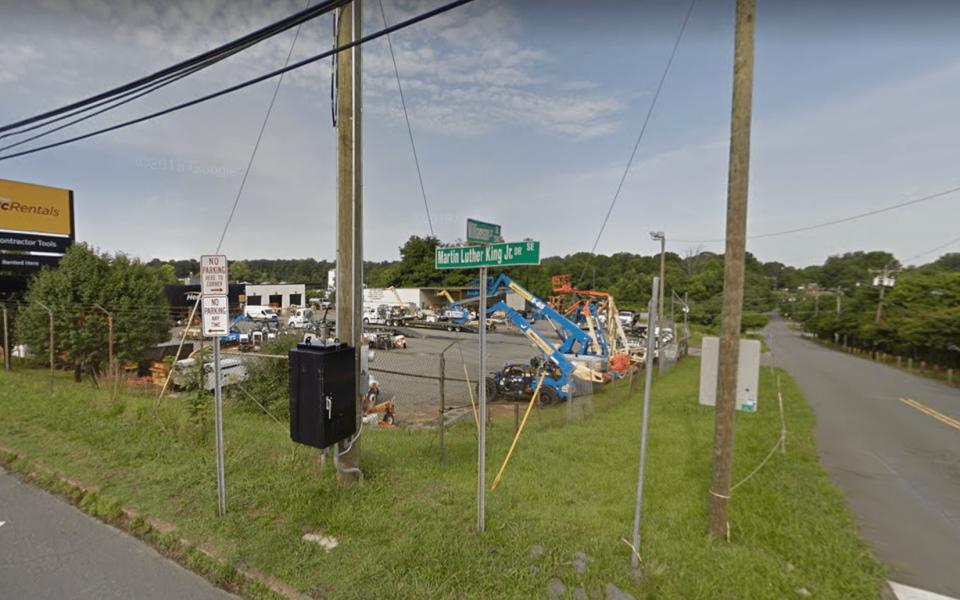“If you look at Dr.
Martin Luther King Jr. drive, what does it really mean?” a woman with a leopard
beret hat on her head asked. “Is it the connotation that Martin Luther King Drive
represents poverty? It shouldn’t. It should represent who he is and who he
was.”
Patricia Degraffinreaidt, an event planner at the Enterprise Conference and Event Center in Winston-Salem, helped organize a documentary screening last Thursday night that explored this very notion.
The MLK Streets Project was released back in 2012 and focuses on the
different streets throughout the US named after the civil rights icon.
The first street to be
named after King was in Chicago, in 1968. Today, the street sheds light on the Great
Northern Migration and features a statue honoring the tens of thousands of African Americans who
migrated from the South to the city. In North Carolina, cities such as
Greensboro, Winston-Salem, Charlotte, Raleigh, Asheboro and many more have followed
suit with streets after him.
The film was inspired by
Chris Rock’s stand-up comedy act called “MLK Blvd,” where he performs a series
of jokes connected to the streets named after the Christian minister and
activist.
“I don’t care where you live in America, if you are on Martin Luther King Blvd.,” Rock says in the film. “It ain’t the safest place to be.”
Before the screening,
viewers grabbed snacks and beverages from a small table outside of the
auditorium. Many adults ranging from ages 40 to 70 sat in the rows of chairs
that were placed in front of the screen.
Colorful, animated faces
of people young and old appeared across the thin material that hung from the
ceiling, followed by the sound of funky ’90s music that echoed throughout the
room then faded to the background.
The film makes the
sobering assessment that despite what the Christian minister and Civil Rights
activist stood for, the streets named after him have high poverty and crime
rates. Many of the interviewees in the film talk about how there aren’t many
African-American-owned businesses today, even though that was one of the many issues
that King was fighting for during his lifetime. On Thursday, the film screening
took place in a center filled with a number of small black-owned businesses in
Winston-Salem.
“This building, the
Enterprise Center, is sitting on 1922 S. Martin Luther King Jr. Drive,” Degraffinreaidt
stated after the film. “In this building — in this whole building we have about
45 small businesses. I think this is an economic base for those small
businesses, to help them grow. We offer to them as many resources as we can, to
help them grow their business.”
After the film, Degraffinreaidt
led the audience in a discussion, her large hoop earrings moving slightly as
she talked.
“Do you, from your
perspective, think that students that hear about Martin Luther King and what
went on, do you think that it is pertinent?” asked one woman to her peers.
Tavin Felton-Stackhouse,
a college student from Winston-Salem State University, responded. “Now, the
younger generation look to a different type of role models,” he said. “For
instance, we have normal people, civil right leaders that we learned about
besides Martin Luther King. So, one of my friends, his inspiration was Kobe
Bryant and his drive and determination and the things that he did.”
“The students do understand, but we have new struggles,” he continued. “Not the exact same struggle, a new struggle of getting into college and can we stay in college or can you afford to stay in college. Once we graduate, can we find jobs in our majors?”
As people began to stand
and file out of the auditorium, Degraffinreaidt, watched from afar and spoke about
how she hopes Felton-Stackhouse’s generation will continue to interpret and
advocate for King’s values.
“Dr. Martin Luther King
wanted his work to speak for him — to define him,” she said. “So, it was my desire and prayer
that it would give some incentive to make people get up and take action.”
For more information check out the trailer on YouTube.
Join the First Amendment Society, a membership that goes directly to funding TCB‘s newsroom.
We believe that reporting can save the world.
The TCB First Amendment Society recognizes the vital role of a free, unfettered press with a bundling of local experiences designed to build community, and unique engagements with our newsroom that will help you understand, and shape, local journalism’s critical role in uplifting the people in our cities.
All revenue goes directly into the newsroom as reporters’ salaries and freelance commissions.


Leave a Reply